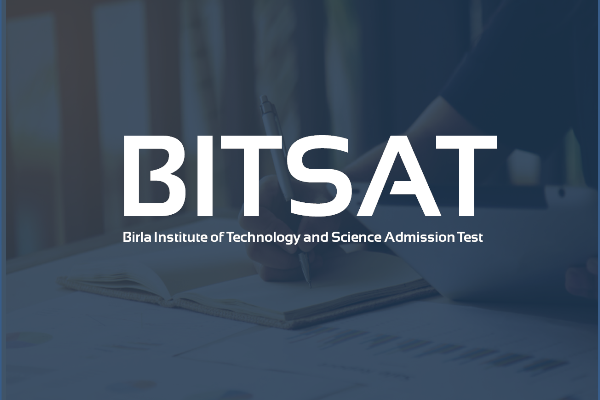Exam Date: August 17, 2025
The Birla Institute of Technology & Science Admission Test (BITSAT) is a university-level entrance exam for admissions to BITS Pilani. The exam is typically conducted twice a year. Careers360 reports that BITSAT 2026 will likely have two sessions, each with its own application window, test dates, and admission process.
Key Details for BITSAT 2026:
Application Window:
Session 1: January 2nd to April 2nd, 2026.
Session 2: Fourth week of May to second week of June 2026.
Test Dates:
Session 1: Third week of May 2026.
Session 2: Fourth week of June 2026.
Eligibility:
Candidates must have passed the 10+2 examination with Physics, Chemistry, and either Mathematics or Biology as compulsory subjects. They must also have secured a minimum aggregate of 75% marks in Physics, Chemistry, and Mathematics (or Biology) and a minimum of 60% marks in each subject.
Exam Pattern:
The exam will consist of four sections with a specific number of questions and a time duration, and a marking scheme for correct and incorrect answers.
Important Notes:
The dates mentioned above are tentative and subject to change.
Detailed information about the application process, syllabus, and exam pattern will be available on the official BITS admissions website, www.bitsadmission.com.
Candidates are advised to regularly check the BITS admission website for any updates or changes in the dates or procedures.
SYLLABUS:
Physics
Class 11 Topics:
• Units & Measurements
• Kinematics
• Laws of Motion
• Work, Energy & Power
• Rotational Motion
• Gravitation
• Mechanics of Solids & Fluids
• Oscillations & Waves
• Thermodynamics
• Thermal Properties of Matter
• Kinetic Theory of Gases
Class 12 Topics:
• Electrostatics
• Current Electricity
• Magnetic Effects of Current
• Electromagnetic Induction
• Alternating Current
• Electromagnetic Waves
• Ray Optics & Optical Instruments
• Wave Optics
• Dual Nature of Matter and Radiation
• Atoms & Nuclei
• Semiconductor Electronics
Tip: Focus on application-based and conceptual numerical questions.
2. Chemistry
Class 11 Topics:
• Some Basic Concepts of Chemistry
• Atomic Structure
• Periodic Table & Periodicity
• Chemical Bonding and Molecular Structure
• States of Matter (Gases & Liquids)
• Thermodynamics
• Equilibrium
• Redox Reactions
• Hydrogen
• The s-Block Element
• Some p-Block Elements
• Environmental Chemistry
• Organic Chemistry – Basic Principles & Techniques
• Hydrocarbons
Class 12 Topics:
• Solid State
• Solutions
• Electrochemistry
• Chemical Kinetics
• Surface Chemistry
• General Principles & Processes of Isolation of Elements
• The p-Block Element (Group 15 to 18)
• The d- and f-Block Elements
• Coordination Compounds
• Haloalkanes and Haloarenes
• Alcohols, Phenols & Ethers
• Aldehydes, Ketones & Carboxylic Acids
• Organic Compounds containing Nitrogen
• Biomolecules
• Polymers
• Chemistry in Everyday Life
Tip: NCERT Chemistry (Class 11 & 12) is the backbone—memorize reactions, mechanisms, and periodic trends.
3. Mathematics
Class 11 Topics:
• Sets, Relations, Functions
• Trigonometry
• Complex Numbers
• Quadratic Equations
• Sequences and Series
• Permutations & Combinations
• Binomial Theorem
• Straight Lines and Circles
• Limits and Derivatives
• Statistics
Class 12 Topics:
• Matrices and Determinants
• Inverse Trigonometric Functions
• Continuity and Differentiability
• Application of Derivatives
• Integrals and their Applications
• Differential Equations
• Probability
• Vectors and 3D Geometry
• Linear Programming
Tip: Emphasis is on speed and accuracy—practice with timers and short tricks.
4. Biology (Only for B.Pharm applicants)
Class 11 Topics:
• Diversity of Living Organisms
• Structural Organisation in Animals and Plants
• Cell Structure and Function
• Plant Physiology
• Human Physiology
Class 12 Topics:
• Reproduction
• Genetics and Evolution
• Biology and Human Welfare
• Biotechnology and Its Applications
• Ecology and Environment
Tip: Focus on NCERT diagrams, terminologies, and factual memory.
5. English Proficiency & Logical Reasoning
A. English Proficiency
• Grammar (Tenses, Prepositions, Articles, Error Spotting)
• Vocabulary (Synonyms, Antonyms, Word Usage)
• Reading Comprehension
• Sentence Completion
• Rearrangement of Jumbled Sentences
B. Logical Reasoning
• Series (Number, Alphabet)
• Analogies
• Logical Deduction
• Blood Relations
• Direction Sense
• Puzzle Test
• Figure Formation and Completion
• Data Interpretation
• Coding-Decoding
• Syllogisms
Focus on application-based and conceptual numerical questions.
NCERT Chemistry (Class 11 & 12) is the backbone—memorize reactions, mechanisms, and periodic trends.
Emphasis is on speed and accuracy—practice with timers and short tricks.
Focus on NCERT diagrams, terminologies, and factual memory.
This section is unique to BITSAT—worth 25 marks and easy to score.
Application Window:
Session 1: January 2nd to April 2nd, 2026.
Session 2: Fourth week of May to second week of June 2026.
Test Dates:
Session 1: Third week of May 2026.
Session 2: Fourth week of June 2026.
BITSAT is the online entrance exam conducted by BITS Pilani for admission to its integrated first-degree programs (like B.E., B.Pharm, M.Sc.) at Pilani, Goa, Hyderabad, and Dubai campuses.
B.E. programs:
Must have passed Class 12 with Physics, Chemistry, Mathematics, and adequate proficiency in English.
B.Pharm:
Must have passed Class 12 with Physics, Chemistry, Biology (Maths also acceptable for some programs).
Minimum Marks:
At least 75% aggregate in PCM/PCB and 60% in each subject (Physics, Chemistry, and Math/Biology) individually.
Yes, appearing students are eligible, but admission is subject to meeting the eligibility criteria after results.
Computer-Based Test (CBT)
Conducted at test centers across India and some international locations
Total Questions: 130
Duration: 3 hours
Marking: +3 for correct, –1 for incorrect
Optional 12 bonus questions if you finish early and attempt all 130
